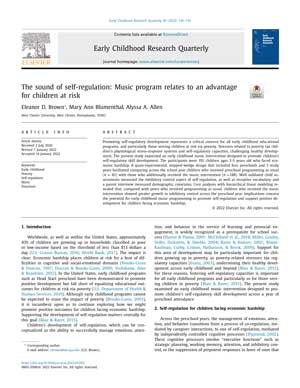Research
Participating schools were asked to commit to integrating music into their daily activities, contribute time, tabulate data, and record anecdotal results.
Preschools were chosen based on meeting specific criteria:
Serve children (3-5 years old) living with economic stressors
Participating students live in similar geographic and demographic settings
Offer quality programming with similar curricula
Express a clear interest in the program and enthusiastically volunteer to fully participate
Research Process
Over a three-year period the research involved:
- Preparatory meetings establishing program elements, goals, and requirements
- Teacher training consisting of weekly modeling and practice of music integration throughout daily classroom activities
- Weekly check-in meetings with MacPhail trainers and classroom teachers
- Weekly data collection
- Pre, mid, post (3x/year) formal assessments conducted by MacPhail research assistant on site
- Quasi-experimental, stepped-wedge design trial where participating preschools were assigned to the interventions in a staggered fashion
Dr. Eleanor D. Brown, PhD
Finally, the Results: Learning with Music is Unique… and It Works!
The key element was training the classroom teachers to integrate music into their daily activities to enhance early learning potentials and executive functioning skills.
MacPhail’s teaching artists led the class in discrete musical activities while demonstrating how to integrate music into the classroom.
Methods include:
Using songs to help smooth transitions between activities
Adding songs to teach letter skills or to deal with problem-solving skills
Adding chants or songs to enhance any aspect of the day’s activities
The goal is that the classroom’s everyday teacher now has the skills to continue the program and integrate music throughout the day.
Read the Early Childhood Research Quarterly Article
The sound of self-regulation: Music program relates to an advantage for children at risk
Article Abstract:
Promoting self-regulatory development represents a critical concern for all early childhood educational programs, particularly those serving children living with the complexities of poverty. Stressors tax children’s physiological stress-response systems and self-regulatory capacities, challenging healthy development. The present study examined an early childhood music intervention designed to promote children’s self-regulatory skill development. The participants were 191 children ages 3-5 years old who faced economic hardship. A quasi-experimental, stepped-wedge design included four preschools and 3 study years across the school year. The child assessments measured the inhibitory control aspect of self-regulation, as well as receptive vocabulary, and a parent interview measured demographic covariates. Analyses revealed that, compared with peers who received programming as usual, children who received the music intervention showed greater growth in inhibitory control across the preschool year. The studies implications concern the potential for early childhood music programming to promote self-regulation and support positive development for children facing economic hardship.




